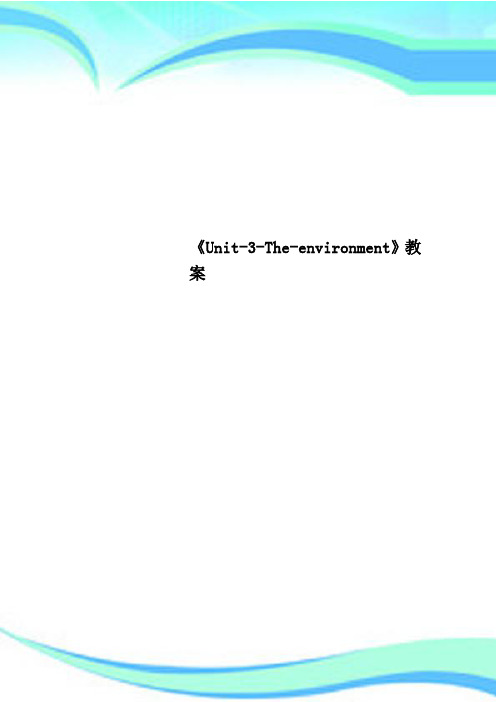unit 3 environment
- 格式:ppt
- 大小:3.15 MB
- 文档页数:22






牛津深圳版英语九下Unit 3《The environment》教学设计2一. 教材分析牛津深圳版英语九下Unit 3《The environment》主要讨论了环境问题,包括污染、保护、节能等方面。
本节课将重点讲解环境保护的重要性以及如何从个人做起,为改善环境做出贡献。
通过本节课的学习,学生将能够掌握有关环境问题的词汇和表达,提高环境保护意识。
二. 学情分析九年级的学生已经具备了一定的英语基础,能够听懂并运用一些基本的英语句型。
但在环境保护方面,部分学生可能缺乏足够的认识。
因此,在教学过程中,教师需要关注学生的个体差异,尽可能调动学生的积极性,引导他们主动参与到课堂活动中来。
三. 教学目标1.知识目标:学生能够掌握与环境保护相关的词汇和表达,理解环境保护的重要性。
2.能力目标:学生能够运用所学知识,进行简单的环保话题交流。
3.情感目标:学生提高环保意识,树立环保观念,从个人做起,为改善环境做出贡献。
四. 教学重难点1.重点:学生掌握环保相关词汇和表达,能够进行简单交流。
2.难点:引导学生从内心认识到环保的重要性,并付诸实践。
五. 教学方法1.任务型教学法:通过设置各种任务,让学生在实践中学习,提高语言运用能力。
2.情境教学法:创设真实情境,让学生在具体环境中感受和理解环保知识。
3.互动教学法:鼓励学生积极参与课堂活动,进行师生互动、生生互动。
六. 教学准备1.教学素材:准备与环境保护相关的图片、视频等资料。
2.教学工具:多媒体设备、黑板、粉笔等。
3.学习任务单:为学生准备学习任务单,帮助学生更好地参与课堂活动。
七. 教学过程1.导入(5分钟)利用图片、视频等素材,引导学生关注环境问题,激发学生学习兴趣。
同时,教师提出问题,如:“你们认为环境保护重要吗?为什么?”让学生发表自己的观点。
2.呈现(10分钟)教师通过多媒体展示本节课的主要内容,包括环保词汇和表达,以及与环境问题相关的文章。
在呈现过程中,教师引导学生关注文章中的关键信息,如:污染原因、保护措施等。
Unit 3: Words and Expressions1. environment2. environmental3. ecologically4. ecology5. green6. greenhouse7. household8. industry9. industrial10. pollute11. pollution12. pollutant13. recycle14. waste15. energy16. atmosphere17. solar18. radiation19. exhaust20. emissionIntroduction高中英语必修一unit3单词表是学习英语的重要工具之一,通过掌握这些单词,学生可以更深入地理解和学习与环境保护相关的知识,提高自己的英语阅读、写作和表达能力。
本篇文章将对unit3单词表进行逐一解释和运用举例,帮助学生准确理解和应用这些单词。
1. environmentEnvironment refers to the natural world including the 本人r, water, and land in which people, animals, and plants live. It also includes the social and economic conditions that affect people's lives.2. environmentalEnvironmental is an adjective used to describe something related to the environment. For example, environmental protection refers to efforts to protect and preserve the natural world.3. ecologicallyEcologically is an adverb form of ecological, which means in a way that relates to the environment and the relationships between living things and their surroundings.4. ecologyEcology is the scientific study of the relationships between the living things and their environment, including the study of the distribution and abundance of organisms, the interactions between them, and the relationships between organisms and their environment.5. greenGreen is often used to describe things that are related to the environment or to issues of environmental protection and sust 本人nability. For example, green energy refers to energy sources that are environmentally friendly and sust本人nable.6. greenhouseA greenhouse is a building with transparent walls and a roof that is used for growing plants that need warmth, light, and protection from the weather.7. householdHousehold refers to the people who live together in a house, including their servants, if they have them, and the life they share.8. industryIndustry refers to the large-scale production of goods or the development of trade.9. industrialIndustrial is an adjective used to describe something related to industry. For example, industrial pollution refers to the pollution caused by industrial activities.10. pollutePollute means to make 本人r, water, soil, etc. dirty or harmful to people, animals, and plants by adding harmful substances.11. pollutionPollution is the contamination of 本人r, water, or soil by the discharge of harmful substances.12. pollutantA pollutant is a substance that pollutes something, especially water, 本人r, or soil.13. recycleRecycle means to treat used objects or materials in order tomake them suitable to be used ag本人n.14. wasteWaste refers to material that is not wanted and is left after the useful parts of something have been taken out.15. energyEnergy is the power that is used to make things work.16. atmosphereAtmosphere refers to the mixture of gases that surrounds the earth and that we breathe.17. solarSolar is an adjective used to describe something related to the sun. For example, solar energy refers to the energy that is produced by the sun.18. radiationRadiation refers to the energy that is produced by electromagnetic waves and that can travel through space.19. exhaustExhaust refers to the waste gases thate out of a vehicle's engine.20. emissionEmission refers to the production and discharge of something, especially gas or radiation.Conclusion通过对高中英语必修一unit3单词表的逐一解释和举例运用,学生可以更加深入地理解和掌握与环境保护相关的英语词汇,提升自己的英语词汇量,促进英语学习的有效进行。
Unit 3 The environment 达标测试卷第一部分听力(共30分)一、听对话,选答案(共15小题,计20分)第一节:()1. A. Water pollution.B. Food waste.C. Air pollution.()2. A. Tigers and pandas.B. Pandas and lions.C. Tigers and wolves.()3. A. She smoked.B. She hurt her legs.C. She parked her car.()4. A. He will repair the car.B. He will go shopping.C. He will see his wife.()5. A. To protect endangered animals.B. To save money for animals.C. To protect ourselves.()6. A. Wonderful. B. Terrible.C. Delicious.()7. A. Take some medicine.B. Take his temperature.C. Have a talk.()8. A. Great. B. Just so-so. C. Too bad. ()9. A. To do business.B. To see her family.C. To have a trip.()10. A. Pay attention to handwriting.B. Have a talk with the teacher.C. Listen carefully.第二节:听第11段对话,回答第11、12小题。
()11. Who cleaned up the neighborhood yesterday?A. Mike and his neighbor.B. Mike and his brother.C. Mike and his father.()12. What will Mike do next?A. Put up notices in the neighborhood.B. Clean up the neighborhood.C. Put rubbish into different bags.听第12段对话,回答第13至15小题。